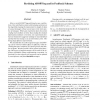Free Online Productivity Tools
i2Speak
i2Symbol
i2OCR
iTex2Img
iWeb2Print
iWeb2Shot
i2Type
iPdf2Split
iPdf2Merge
i2Bopomofo
i2Arabic
i2Style
i2Image
i2PDF
iLatex2Rtf
Sci2ools
IAT
2007
IEEE
2007
IEEE
Revisiting ADOPT-ing and its Feedback Schemes
Here we revisit ADOPT-ing and bring two new contributions. One contribution consists of developing variations on the algorithms keeping the improvement in length of chain of causal messages without an increase in the total number of messages. While past experiments have shown that sending more feedback is better than sending the minimal information needed for correctness, new experiments show that one should not exaggerate sending too much feedback and that the best strategy is at an intermediary point. This brings large efficiency improvements. We also find that one of the nogood storages of ADOPTing can be removed without effects on efficiency while decreasing the space complexity by a factor given by the number of agents. We also provide a more general proof showing which types of nogood storages can be used in the inference of feedback without compromising correctness. In particular we show that all such structures can be updated by sum-inference, and from threshold messages.
| Added | 02 Jun 2010 |
| Updated | 02 Jun 2010 |
| Type | Conference |
| Year | 2007 |
| Where | IAT |
| Authors | Marius-Calin Silaghi, Makoto Yokoo |
Comments (0)

